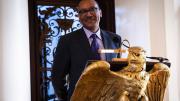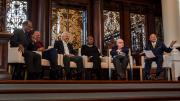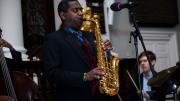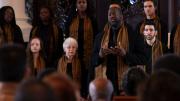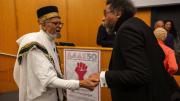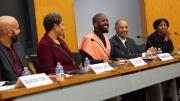Last Saturday evening, toward the end of a two-day symposium commemorating the fiftieth anniversary of the African and African-American studies department (AAAS)—an event filled with stories and music, memories of struggle and achievement, and with searching discussions about the future of the field—Cornel West put into words an uneasiness that had been tugging at the celebrations all weekend long. “We’ve got to recognize,” said the professor of the practice of public philosophy, “that this golden age that we’re talking about coincides with a catastrophic age for black, poor, and working people.”
West was speaking as part of a panel on scholar-activism, but there was broader resonance in what he said. The previous evening, Farah Jasmine Griffin ’85, chair of Columbia’s African American and African Diaspora studies department, had delivered a keynote address articulating a similar contradiction. “The rise of right-wing populist nationalism, naked white supremacy, and neo-fascism throughout the Americas, Europe, and Asia,” she said, “has been especially striking just as the knowledge produced by African-American studies has informed contemporary movements against mass incarceration and state-sanctioned violence against people of color.”
Claudine Gay, dean of the Faculty of Arts and Sciences and Clowett professor of government and African and African-American studies, spoke of the department’s founding as a “watershed moment in what, frankly, remains an ongoing project of building a truly inclusive scholarly community.” Later, Sangu Delle ’10, M.B.A. ’16, J.D. ’17, an entrepreneur and activist for health care and clean water rights in West Africa, described his arrival at Harvard, with its African studies concentration, as the culmination of a dream he’d had since he was a five-year-old boy living in Ghana. “But let’s face it,” he cautioned: “It is not a given that what we celebrate today will continue. These gains can go away tomorrow with a different [University] administration. It is not enough for us to sit and rest on the charity of those in power; we need to sustain and hold onto those gains.”
And yet, those gains are also real and remarkable. The student movement to push for what would become AAAS began days after Martin Luther King’s assassination in April 1968, with an advertisement placed in the Harvard Crimson demanding courses and an endowed chair for a black professor. Within weeks, a 10-member ad hoc committee was established to negotiate with the University for a department of African-American studies with the power to appoint and promote its own faculty and set its own curriculum. In 1969, after mass protests and months of tense talks, the faculty approved the department’s founding. In 1972, the first class of 14 students graduated with degrees in Afro-American studies.
During a panel discussion moderated by Fletcher University Professor Henry Louis Gates Jr., alumni and professors who took part in the founding spoke about those early days. “I did not appreciate sufficiently the political importance of what we were doing,” said Henry Rosovsky, the former dean of the Faculty of Arts and Sciences, who released a report in 1969 calling for a black studies department and research institute. “This was a hell of a lot more than just an academic program.” Jeffrey Howard ’69, Ph.D. ’80, a member of the ad hoc committee, recalled, “We wanted to be seen and recognized as an important part of American society. And the department seemed to be a vehicle for that.” Sociologist Orlando Patterson, who joined the faculty in January 1970, recalled arriving on a Harvard campus full of noise and excitement and promise.
In a speech on the evolution of AAAS, department chair Tommie Shelby, Titcomb professor of African and African-American studies and of philosophy, recounted its triumphs and glories but also the “missteps, disappointments, crises, and setbacks.” In 1991, with the department near collapse after years of academic decline and under pressure again from student protests, Harvard hired Gates—then a much sought-after young literary scholar—as chair, a position he would occupy for 15 years, overseeing a full-scale rebirth. By the mid 1990s, the number of concentrators had rebounded dramatically, and Gates had helped recruit prominent academics who became key members of the faculty: historian Evelyn Brooks Higginbotham, sociologists William Julius Wilson and Lawrence Bobo, philosophers Kwame Anthony Appiah (now at New York University) and Cornel West. All of them were in attendance last weekend, shaking hands and sharing hugs, along with former professor Ephraim Isaac, B.D. ’63, Ph.D. ’69, who’d pushed early on for African language instruction in the curriculum, and whose tenure denial in the mid 1970s touched off a national controversy.
Today, AAAS is one of the leading departments of its kind in the country, with 41 full-time faculty members, 40 undergraduate concentrators, and 35 doctoral students. Professors in AAAS are also administrative leaders at Harvard: Gay as dean of FAS, Du Bois professor Lawrence Bobo as dean of social sciences. Initially focused almost exclusively on North America, it now includes not only African studies, but studies of the Caribbean and Latin America. Its course offerings have grown from about 25 classes in 1969 to more than 200 now, including 18 African-language courses. (The Harvard Alumni Association is producing a “Red Book” for AAAS this year, collecting essays from alumni concentrators, faculty members, and administrators to mark the fiftieth anniversary.) “My colleagues and I are grateful to those who pioneered these efforts,” said Shelby, “and we sincerely hope that they are proud of what we’ve done with their legacy.”
There were newer stories, too, of what AAAS has become, and what it has meant to successive generations of alumni. Writer Sharifa Rhodes-Pitts ’00 remembered spending a class period learning about Jean Toomer’s Cane from Farah Jasmine Griffin, and realizing, as the lecture went on, “that I had never before been taught literature by a black woman, aside from my mother, who was the first person who taught me anything about reading and writing. And it was so moving. And, just, a moment of stepping on the path.” Television executive Terence Carter ’01 talked about struggling to find his identity as the son of a black father and white mother, and the stable grounding and sense of rootedness AAAS had provided. Delle, the West African entrepreneur, described the often-unpleasant shock of discovering, as a new arrival to this country, “what it means to be black in America.” Amid those experiences, he came to rely on AAAS as a force for navigating his life. “This department is the resting place.… It’s beyond the academic excellence. It is the spiritual home for people of color at this university.”
Brandon Terry ’05, now an assistant professor in AAAS, talked about a similar kind of revelation. His freshman fall semester began the day after September 11, 2001—a bewildering, shattered time, he said. “I remember walking down Mass Ave and seeing a Muslim woman assailed by a group of drunk white men on the street. It was just a terrifying moment without a lot of clarity.” Later that month, he heard Cornel West speak on campus and was drawn to the professor’s argument that “there was something about the black experience and being permanently subjected to arbitrary violence, humiliation, vulnerability,” and that this was experience the nation at large was suddenly having to wrestle with. “Professor West was mining the history of African-American life and culture to point toward a different way” of responding to the terrorist attacks. “I’d never heard of African-American studies before I got here,” he said. But the department “helped someone like me, who grew up around questions that are not just academic abstractions: of mass incarceration, ghetto poverty, and the long history of racial injustice in the United States...to give me a way of thinking through the ethics of the response.”
The symposium’s final session—the panel discussion on scholarship and activism, during which West highlighted the dichotomy between the flourishing of African-American studies and the struggle of African-American people—seemed to bring the conversation full circle, back to the ideas and impulses, and the politics, that shaped the department’s earliest days. Moderated by historian Elizabeth Hinton (who departs for Yale this summer), the conversation stretched long past its scheduled stopping point, as listener after listener raised their hands to ask about how to bridge the chasm between the academy and the community, how to forge connections between black-studies scholars and young people out on the streets, how to turn research into concrete civic action, how to hang onto one’s integrity as both a scholar and a citizen, how to maintain hope in dark political times.
Hinton’s answer: “We actually need to go to communities,” she said. “We have to go and speak to elementary schools and speak to high schools and work with community organizers who are on the ground.” (Hinton studies mass incarceration and works to bring college-level courses into prisons.) “I think that requires a lot from us. But we're not going to be able to speak to communities unless we make ourselves a part of the community.”
Weighing the responsibility black scholars often feel to advocate for black people outside academia, Imani Perry, J.D.-Ph.D. ’00, acknowledged, “There are always ideological commitments.” What protects scholars from being driven uncritically by their passions, she said, is rigor. “That's what we've been talking about in many ways in the conversations this weekend about methods and what interdisciplinarity means, about what kind of training we need to have. And it is particularly the case, when one is talking about the liberation of people, that you need rigor.”
She spoke, too, about honesty and self-awareness: “As a faculty member of Princeton, I understand that I am a part of the engine of social class reproduction and sustaining the status quo. I think to be a person of conscience in this career demands a commitment to disruption…so that at the very least I can try to undo the ways that I participate.” (This was a point West echoed: “Our struggle becomes, how do we not become simply more colorful folk within these deep hierarchies that are reproducing the very thing that the masses revolted against in order to create black studies?”)
The last audience question the panel took was the one about hope, from a Harvard undergraduate who described feeling sometimes overwhelmed by what he was reading in his coursework on race and racism and what he was seeing in the world. Perry took a long breath. “I don’t always have hope as an article of faith,” she said finally, “but I have it as a praxis.” She called this a moral imperative—“to practice hope even if you don’t feel it.” At Harvard, “all the intellectual work is intended to transform society, and you have to be able to imagine even the thing that you can’t see.” Perry, whose history of “Lift Every Voice and Sing,” a song of freedom and protest often referred to as the black national anthem, was published in 2018, turned to the figure of Harriet Tubman, who escaped slavery in Maryland in 1849 and immediately went back to rescue her family. And then went back again, and again. In all, Tubman made more than a dozen trips into to the South through the Underground Railroad to rescue nearly 100 people from slavery. “All the black folks who escaped plantations prior to the Civil War,” Perry said, “there was no ability to actually see in real terms what might come to be. It was an act of the imagination made real.” She looked up at the student with something like a smile. “So that's—that's all I got.”
